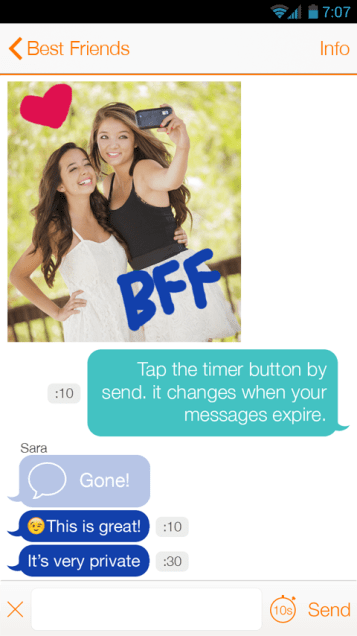
Blink, a mobile application that allows users to send each other self-destructing messages, has now arrived on Android. The app, which first debuted on iOS last spring, lets you share text, photos, videos, sketches, and even voice messages with your friends, though the company has found that the majority of its users are using Blink for “ephemeral” texting purposes.
The app competes with a growing number of anonymous and/or private messaging apps, like Snapchat, Frankly, Confide, Whisper, Secret, and others. Like many in this space, Blink doesn’t require that you use your “real” identity on its service – your username can be anything you choose.
Today, 65% of registered users on Blink are anonymous users, and 85% of messages sent on the app were sent by anonymous users. Plus, 69% of users return to the app after their first use, which is more than decent engagement.
The company behind Blink was founded by ex-Googler Kevin Stephens and Michelle Norgan, and was originally focused on a location-based social service called Kismet that grew in popularity around the time of SXSW 2012, when apps like Highlight and Banjo were all the rage. But Kismet never really took off, and as the location-based trend itself died down, the team decided to repurpose the technology for mobile messaging with Blink.

“We want to let people be as anonymous, disconnected, and “off the grid” as they choose to be,” explains Stephens. “Whereas nearly all mobile messaging apps require a user to verify their phone number or confirm their identity in some way, the vast majority of our users prefer to remain anonymous,” he says.
To date, Blink has seen around 100,000 downloads, but what’s interesting are the app’s demographics. Though around 51% of the app’s user base is in the U.S., the next largest market Blink serves is the Middle East (15.4%), and nearly all of that group is from Saudi Arabia.
Blink’s traction in the Middle East makes sense, says Stephens, given how scarce privacy and anonymity are there. But he was also surprised that the service was taking off in that market, as it didn’t yet support Arabic.
“We believe a fair number of the anonymous users in the Middle East are ex-pats working overseas,” Stephens says.
Blink will now cater to this market in particular with localization to Arabic, and pro features that will be particularly relevant to businesses or ex-pats overseas who are concerned about anonymity and privacy. For instance, Blink will begin exploring more professional use cases – like wiping the messages off an employee or contractor’s phone when they’ve finished a job.
Demand for Blink on Android was higher than typical, Stephens adds. Invite referrals to non-iOS devices had been ranging between 3-4 times than of iOS referrals, which he believes reflects Blink’s popularity in markets like the Middle East where Android tends to dominate.
The new app is now available for download here on Google Play, or here on iTunes.
Read more : Anonymous Messaging App Blink Arrives On Android

0 Responses
Stay in touch with the conversation, subscribe to the RSS feed for comments on this post.